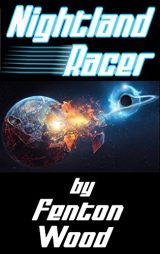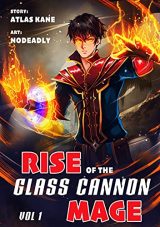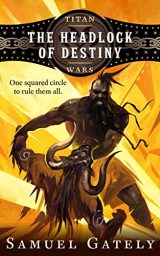Nightland Racer and The Hammerlock of Destiny
Sunday , 22, August 2021 Uncategorized Leave a comment Reynard “The Fox” Douglas is an outlaw racecar driver who despises the government that jailed him, drafted him, and seized his money. He’s also the only man with the skills to pilot an experimental race car into a strange Zone that is growing in New Mexico, a place where nothing gets out alive. Charged to find whatever is causing the Zone and destroy it, Reynard overshoots his goal–by millions of years. Now stranded on a nighttime Earth in the shadow of a dying demon star, Reynard must race past abhumans, demons, and even the twisted remnants of humanity as he tries to discover what happened to Earth and if it has any connection to the Zone he left behind.
Reynard “The Fox” Douglas is an outlaw racecar driver who despises the government that jailed him, drafted him, and seized his money. He’s also the only man with the skills to pilot an experimental race car into a strange Zone that is growing in New Mexico, a place where nothing gets out alive. Charged to find whatever is causing the Zone and destroy it, Reynard overshoots his goal–by millions of years. Now stranded on a nighttime Earth in the shadow of a dying demon star, Reynard must race past abhumans, demons, and even the twisted remnants of humanity as he tries to discover what happened to Earth and if it has any connection to the Zone he left behind.
Fenton Wood returns with Nightland Racer, inspired by William Hope Hodgson’s The Night Land. If Wood’s Yankee Republic was a past that should have been, Nightland Racer is a future which should never be. The familiar signposts are here, from abhumans to strange Watchers and the Lesser and Last Redoubts of men. But Wood refuses to wallow in defiant last stands and grim dark futures. Instead, he swerves hard right from the Redoubts towards something more hopeful and far more desperate: how to fix the cursed Night Land. Reynard soon finds himself walking in the steps of Hercules as he strives against the demon star that replaced the Sun. But as fanciful as the scenario may be, Wood grounds the shifts in lands and peoples in a hard science sensibility that heightens the horrors of the Night Land instead of undercutting it. With Nightland Racer, Fenton Wood spits in the eye of science fiction’s woeful lament about the loss of wonder caused by “single vision and Newtons sleep” and delivers a rousing mix of the mythological and the technological that should be a signpost for science fiction’s future.
 Jory Mitchels was there at Ground Zero when the alien artifact crashed into Earth and turned our world into a living MMO. Unfortunately, so was his boss, the worst sort of crystal-worshipping New Age motivational speaker to inhabit the C-suite. Said boss is now drunk on the power of real magic, and is now raising a cult across the newly digital landscape, spreading his good word with the point of the sword. Jory must face off against his boss once and for all, not only because he has been given a quest by the system running the fantasy takeover of Earth, but for payback for years of indignities.
Jory Mitchels was there at Ground Zero when the alien artifact crashed into Earth and turned our world into a living MMO. Unfortunately, so was his boss, the worst sort of crystal-worshipping New Age motivational speaker to inhabit the C-suite. Said boss is now drunk on the power of real magic, and is now raising a cult across the newly digital landscape, spreading his good word with the point of the sword. Jory must face off against his boss once and for all, not only because he has been given a quest by the system running the fantasy takeover of Earth, but for payback for years of indignities.
Atlas Kane’s Rise of the Glass Cannon Mage so desperately wants to be a light novel. And it has some of the elements: interior illustrations, a burnout salaryman given another chance at life, and a smattering of litRPG elements and systems. But there’s a bit of a bait and switch in that Glass Cannon Mage is closer to the harem tamer genre than the typical light novel antics of Konosuba or Danmachi. It just doesn’t come with the pin-up covers common to its English-language genre. That’s not to say that there aren’t a few interesting ideas inside the litRPG systems here, it’s just that the world-spanning consequences of a complete planetary makeover are undone by a plot confined to a single county. And, despite the grandeur of the name, Jory never quite lives up to the title, neither in class or in deeds. This isn’t bad fantasy, or poorly executed fantasy, but it is in desperate need of some flash to liven it up. Something besides fanservice.
 In a not-too-distant fantasy world, the titans were once renowned as army-killing giants. After a cataclysmic battle, their power was constrained by law and by force. But a titan’s got to fight, so the square circle was opened to them. Now instead of battles, the fates of nations rest on the outcome of wrestling tournaments, where the strongest nations employ the strongest titans. And Headwaters has just lost their titan to injury.
In a not-too-distant fantasy world, the titans were once renowned as army-killing giants. After a cataclysmic battle, their power was constrained by law and by force. But a titan’s got to fight, so the square circle was opened to them. Now instead of battles, the fates of nations rest on the outcome of wrestling tournaments, where the strongest nations employ the strongest titans. And Headwaters has just lost their titan to injury.
Enter Van the Beer Man, a young titan more used to busting barrels than busting heads. All he has to do is show up and fall down at the right time in the match, as even a quick loss is better than not having any titan in the Headlock of Destiny tournament. But fate has other intentions for this newest of wrestlers.
Samuel Gately’s The Hammerlock of Destiny reads as though it came from a fever dream, replacing sword and sorcery with professional wrestling. Indeed, there are more than a few head-nods to WWE and other wrestlers in the story, which echoes the 1996 King of the Ring tournament and the rise of Stone Cold Steve Austin. But it places this against the familiar return of dark powers common to epic fantasy. Van’s climb from social reject to king of the ring might be well-trod territory, but this is one time where the juxtaposition of the epic and the personal works well. For when Van’s immaturity begins to get a bit insufferable, the specter of the dark powers threatening to unleash a titan war brings relief. The action is quick and true to anything that can happen in the squared circle. And while professional wrestling epic fantasy may not appeal outside of a select audience, this is one novel experiment that, for the most part, works and works well.
Please give us your valuable comment